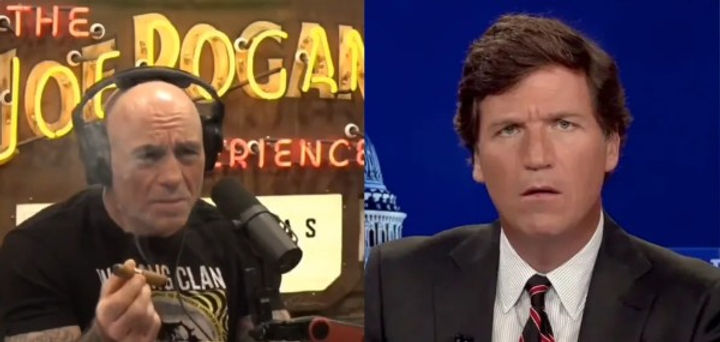This the second of two columns to post this week in which author, historian and occasional CHQ contributor Diana West shares the discoveries she made on a recent journey through the fast-evolving landscape of podcasters and “influencers” who have come to have an

outsized influence on conservative audiences, perhaps the most puzzling and troubling is the airtime given to quack “historian” Darryl Cooper.
One of the more interesting things Darryl Cooper revealed while ensconced on the massive Joe Rogan platform last week concerned his appearance on the even more massive Tucker Carlson platform last summer. It was the night before the Carlson interview, Cooper recalled, and he and Carlson were having dinner, talking about the upcoming show. Carlson informed Cooper that he was going to introduce him as America’s greatest living historian. Cooper says that he demurred, having explained to Carlson that he was no historian, did no original research, published nothing; rather, that he was someone who recorded stories about what he had read.
Carlson was having none of that. He was dead set on tagging Cooper with this nonsensically extravagant accolade and told him just to roll with it during the taping the next day. If you go back and watch Tucker’s opening of the Cooper show, you will notice that no blush, no gulp, and barely a muscle move across Cooper’s face as Tucker coats him with this syrupy wash of words — “the most important popular historian working in the United States today.” But even that wasn’t enough for Tucker: “I want people to know who you are, and I want you to be widely recognized as the most important historian in the United States today because —”
Yes, yes … why? Tell us why!
“— because I think that you are.”
If Carlson’s motives remain opaque, we are now at least privvy to the calculation, the Barnum-esque decision, to dress up the podcaster as this “greatest,” this “most important” historical expert in the whole of these United States. This created what I see as the moving target. Step right up and take you turn … and sure enough, a flurry of “outlets” I don’t pay attention to, and a clutch of “court historians” (ditto) stepped right up and took their turn at shooting down some of the clunkier clay pigeons Cooper launched — Churchill, the “chief villain” of World War II (Cooper also called him a “psychopath”), Hitler, the peacemaker (Cooper did not call him a “psychopath”), and the Holocaust, the accident, which Cooper did not name at all. The massive response was more like shooting fish in a barrel. Surely, I thought, something else was going on in or around this apparent provocation.
My own concern at the time, truth be told, was Donald Trump. The interview aired in early September, the traditional kick-off of the final stretch of the presidential campaign. As usual, the Left, reading from the old communist playbook, was desperately, noxiously slandering Trump as the reincarnation of Adolf Hitler.
What was Tucker thinking — as closely associated with Trump as he is, and with that huge MAGA audience — when he deliberately interjected Hitler into the campaign season? After all, it was Tucker’s Trump-adjacent platform that accounted for most of the angry denunciations, drawing a level of criticism a Trump-neutral venue would not have inspired from the White House, Congress, even Yad Vashem.
As the saying goes, there are no coincidences, comrade — so, really, what was this all about? An air of contrivance still nags at me. I say this, I feel this, at least partly because I have a peculiar non-role in this whole — dare I use the Yiddish word? — geschrie. That’s because I, a journalist, not a historian, wrote a counter-conventional-history of World War II and the Cold War. It’s called American Betrayal, and it is a chronicle of the long-hidden war that no one wants to talk about, whether Conventional Churchillian or Carlsonian Hitlerite. It lays out the massive, secret war of communist subversion waged inside our policy- and war-making councils, which, once perceived, turns the World War II we all know and regularly commemorate into the war that actually made the world safe for communism. It turns the leaders we are taught to honor for “saving Western civilization” from Hitler into patsies of (see FDR), if not parties to (see FDR), Stalin’s long-term strategy to capture and destroy it. By the way, Stalin and FDR are AWOL from these online Cooper interviews.
In any case, having written such a book (which, in podcasting terms, comes to an audiobook of 20 hours and 41 minutes) — I came to know what controversy is. I know what smear campaigns are, too. My book triggered both and more — including what one reviewer called a “disinformation campaign.” In the course of this campaign of villification, there were so many straight-up, demonstrable lies published about the contents of my book that I spent a couple of years in fairly constant turmoil rebutting them. These features are not present in the current controversy.
I mention this background because it is my experience in these matters that tells me there is something ersatz in the “creation” of Darryl Cooper as a free-speech-hero pushing the boundaries of — pushing the boundaries of what? Not the boundaries on what is discussed about World War II exactly, including its origins. I am still thinking again about the absence of the super-villainous roles played by Stalin, also FDR, which failed to make it into these MAGA+ presentations. They complain about taboos and the “reductionist perspective” even as they tee up a “reductionist” storyline of their own which packages WWII as a face-off between Churchill and Hitler — and, pace Darryl Cooper, Hitler, we hardly knew ye.

There are times when a viewer — say, the average college graduate (no historical grounding) — will miss what it is that Cooper and his MAGA hosts are actually talking about because of the elliptical language they use to communicate.
Take Cooper’s conversation with Tucker about laws in Europe banning Holocaust denial. They go on and on about them, but never name the laws they are talking about. For example, Cooper bemoans the fact that European courts have been for “the last 70 years putting people in jail for looking into the wrong corners.” Wrong corners? What wrong corners? Tucker adds: “Literally, it’s a crime to ask questions.” What questions? What crime? They fail to mention even in passing the free-speech-travesty of Europe’s Holocaust denial laws. I don’t know of anyone who supports them, by the way. This omission is bizarre. Is it calculated? Perhaps they both find themselves simultaneously wary about using the words “Holocaust” and “denial” as they discuss the hardships visited upon those who look into the “wrong corners” and dare to “ask questions.”
Finally, Tucker asks Cooper: “Do you think we are far enough away, 80 years, from that war, where you can try to take as objective a look as you can and that will be allowed”?
Without hesitation (pre-set question?) Cooper replies: “No, I don’t. I think we’ve got a little ways to go on that, but I hope I can kind of start to break the ice a little bit.”
Given the context outlined above, what Cooper is hoping to “break the ice a little bit” on is Holocaust research (“denial”?), and, as we learn with more specificity from his recent appearance on Rogan, World War II “from the perspective of the Germans.” But hey — whatever floats your ice-breaking boat. Go for it, Darryl Cooper. Harkening back to the Tucker’s Big Build-Up, however, why is this particular line of research and approach to the past the essential, if weirdly coded knowledge “America” — MAGA — must have?
On considering this perplexity, it somehow seems relevant to take into account Tucker Carlson’s apparent penchant for strongmen. I don’t know much about Rogan, although during the Cooper interview he comes out as enthusiastic supporter of socialized medicine, one of the building blocks of socialist/communist systems. Tucker’s positive view of Putin in Russia is well known; more recently, he has racked up a series of smarmy interviews with Islamic strongmen throughout the sharia states of the Arab world. As I work through this essay, a TikTok clip is going around of Tucker extolling El Salvador’s Bukele and what Tucker calls “right-wing authoritarianism” in general. He goes so far as to discuss “right-wing authoritarianism” as a “popular” model for the world. “I love democracy, free speech is the most important thing to me,” he quickly adds (interrupting himself the way he does).
Really? I do not recall Tucker Carlson ever showcasing the free-speech-heroes of our day who have spent their adult lives fighting against the Islamic-sharia- and Marx-derived censorship that has strangled Europe. These heroes include Geert Wilders, Filip Dewinter, writers and free speech activists such as Lars Hedegaard, Elisabeth Sabbaditsch-Wolff, and political prisoner Tommy Robinson, who, after 147 days in solitary confinement and counting, is being tortured and destroyed by the British government as a mentally functioning human being for charges related to posting a news documentary online. If free speech is “the most important thing” to Tucker Carlson, its leading European champions should be important to him as well, but they are not. This tells me we are looking at more posturing. [April 3, 2025 correction: Carlson interviewed Tommy Robinson on Fox News seven years ago.]
One other thing. By implication, Tucker’s Tik Tok throws Hitler into this same “right-wing authoritarian” mix, albeit as a failure (“disgusting”) due to “bigotry and Nazi shit where you’re killing Jews and whatever.” (Love the “whatever.”) Framing Nazism — a contraction of “national socialism” — as a right-wing system is common on the Left, which persists in denying its roots in Marxism. Karl Marx, by the way, was a raging antisemite.

Tomorrow: Part Two of Diana West’s “What’s It All About, Carlson & Rogan?”
-
Tucker Carlson
-
Joe Rogan
-
Darryl Cooper
-
Historians
-
Bloggers
-
Podcasters








